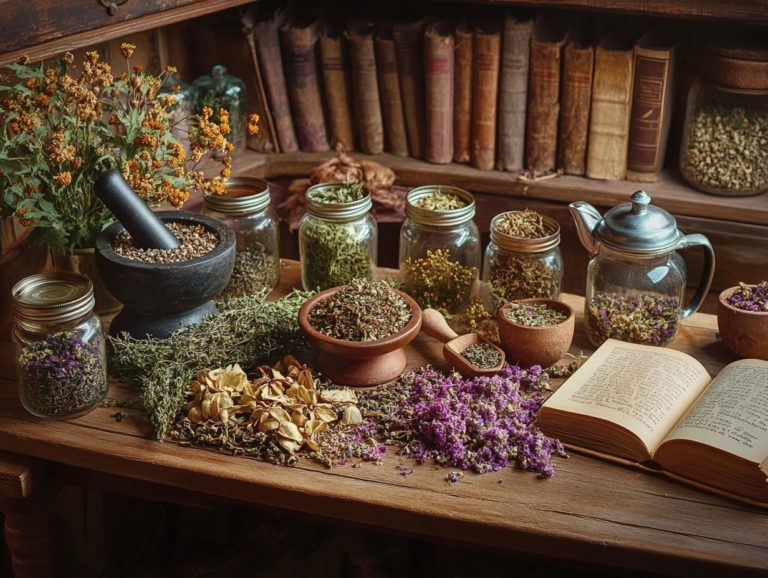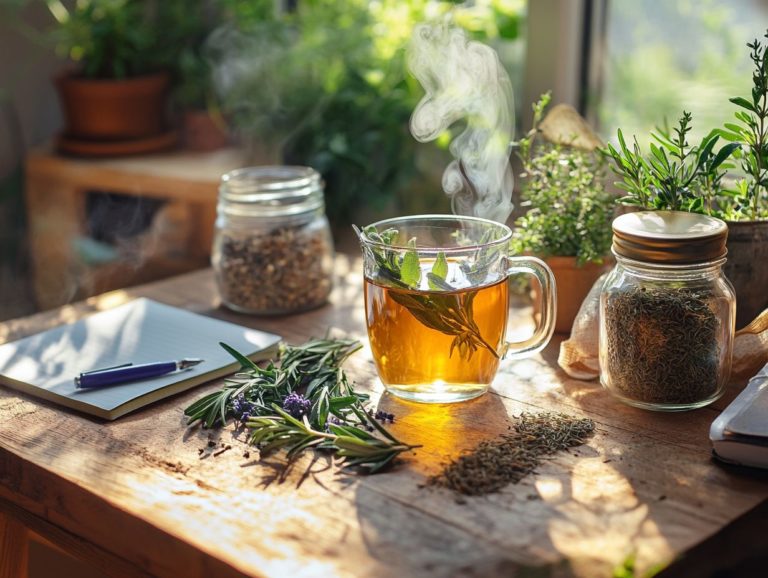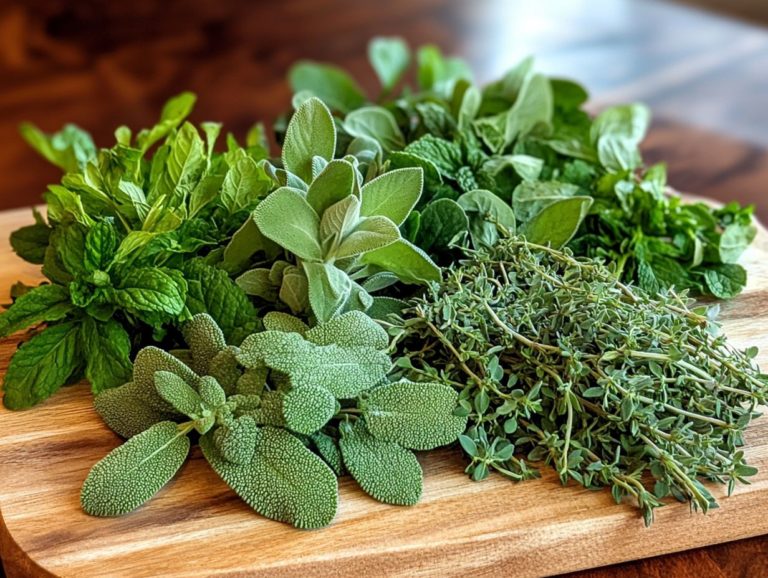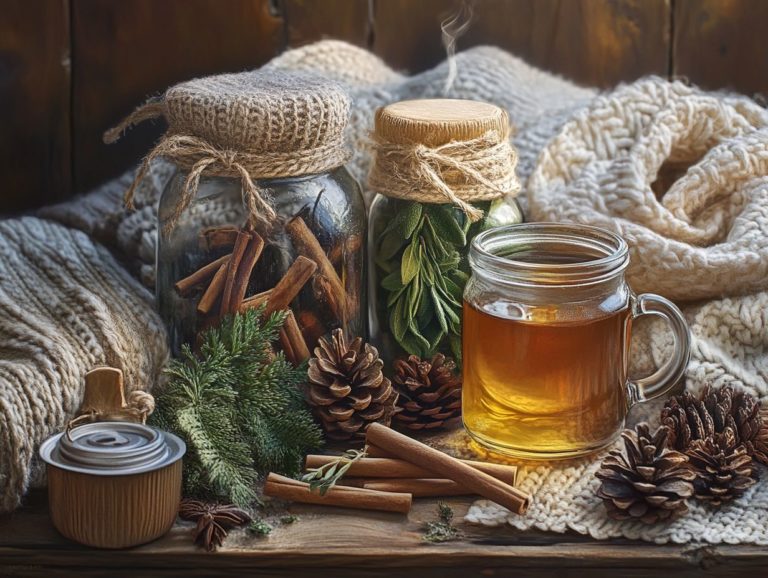5 Herbal Remedies for Better Circulation
Struggling with poor circulation? You re certainly not alone. Many individuals face symptoms that can interfere with daily life. Fortunately, nature offers a range of herbal remedies that may help improve blood flow.
This article delves into five powerful herbs Ginkgo Biloba, Cayenne Pepper, Garlic, Horse Chestnut, and Ginger that could naturally enhance your circulation.
You ll learn about the causes of poor circulation, its effects on the body, and essential precautions to keep in mind. Discover how to seamlessly incorporate these remedies into your routine for improved health and well-being.
Contents
- Key Takeaways:
- 1. Ginkgo Biloba
- 2. Cayenne Pepper
- 3. Garlic
- 4. Horse Chestnut
- 5. Ginger
- What Causes Poor Circulation?
- How Can Poor Circulation Affect the Body?
- What Are the Symptoms of Poor Circulation?
- How Can Herbal Remedies Improve Circulation?
- What Are the Possible Side Effects of Using Herbal Remedies?
- What Are Some Other Ways to Improve Circulation Naturally?
- When Should One Consult a Doctor for Poor Circulation?
- Can Herbal Remedies Be Used Alongside Medications for Circulation?
- How Can One Incorporate These Herbal Remedies into Their Daily Routine?
- What Are Some Precautions to Take When Using Herbal Remedies for Circulation?
- Frequently Asked Questions
- What are the top 5 herbal remedies for better circulation?
- How does ginger improve circulation?
- Can cayenne pepper help with poor circulation?
- What is the recommended dosage for ginkgo biloba to improve circulation?
- Is it safe to consume garlic for better circulation?
- Can herbal remedies for better circulation interact with medications?
Key Takeaways:
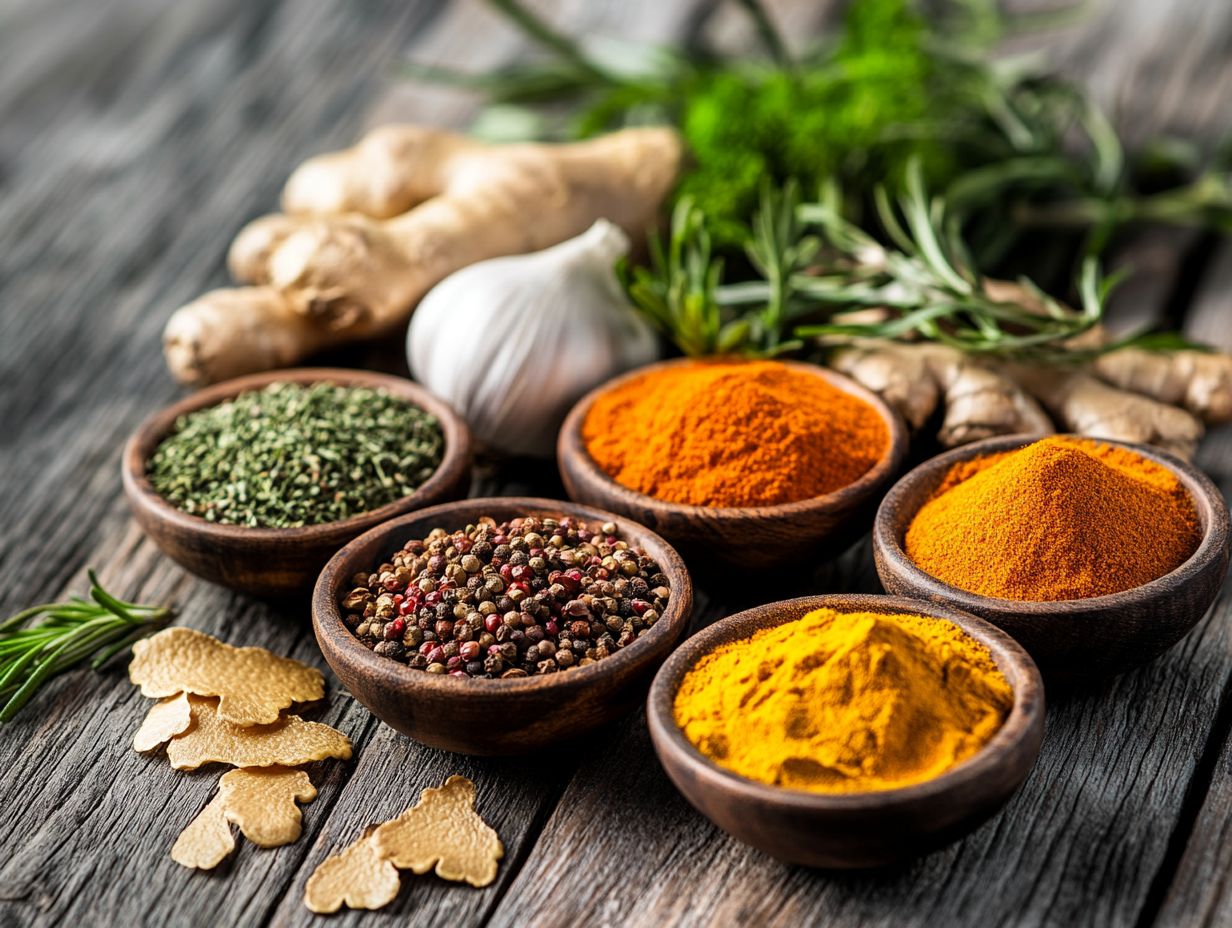
Ginkgo Biloba, Cayenne Pepper, Garlic, Horse Chestnut, and Ginger are herbal remedies that can help improve circulation and relieve symptoms of poor circulation. Poor circulation can lead to serious health issues, so it’s important to consult a doctor if experiencing symptoms. Along with these remedies, other natural methods like exercise, hydration, and a healthy diet can also help improve circulation.
1. Ginkgo Biloba
Ginkgo Biloba is a celebrated herbal remedy that enhances blood flow. It plays a vital role in promoting heart health and warding off cardiovascular diseases.
This ancient herb has gained significant attention for its remarkable properties. It’s often used in herbal medicine to boost circulation and support overall well-being.
Its effectiveness arises from several mechanisms. It helps dilate blood vessels and reduce the thickness of the blood, which facilitates a greater delivery of oxygen and nutrients throughout your body.
Ginkgo not only supports your heart function but also helps you think better by improving circulation to your brain.
For most individuals, a daily dosage of 120 to 240 mg is recommended. It s wise to consult a healthcare professional to customize the dosage to your specific needs.
While generally well-tolerated, some might experience mild side effects like headaches or gastrointestinal upset. Compared to other remedies like garlic or turmeric, Ginkgo s synergistic action enhances its appeal, making it a preferred choice among herbal supplements for cardiovascular health.
2. Cayenne Pepper
Cayenne pepper is a spice brimming with capsaicin. It s renowned for its ability to invigorate blood circulation and enhance heart health, making it a valuable ally in your wellness-focused dietary habits.
This vibrant spice does more than just add heat; it can also stimulate blood flow, lower blood pressure, and reduce the risk of cardiovascular diseases.
Incorporating cayenne pepper into your daily meals can be effortlessly enjoyable. Just sprinkle it on soups, salads, and stir-fries, or blend it into smoothies for a delightful spicy kick.
While the health benefits are plentiful, remember that moderation is key. Too much cayenne can lead to digestive discomfort.
If you have specific health concerns, such as ulcers or acid reflux, it s prudent to consult a healthcare professional before introducing this potent spice into your diet.
3. Garlic
Garlic isn t just a tasty addition to your culinary repertoire; it s a remarkable herb that enhances blood flow. It s associated with a reduced risk of heart disease thanks to its antioxidant properties.
By weaving this humble bulb into your diet, you can experience noteworthy improvements in cardiovascular health. It helps keep your cholesterol in check and manage blood pressure effectively.
To truly harness garlic’s benefits, consider consuming it raw or crushed, as this method preserves its powerful compounds. While cooking can diminish some of its healthful attributes, a light saut can still offer advantages.
It’s important to remember that while garlic is generally safe, overindulgence can lead to digestive discomfort or allergic reactions in some people. Therefore, moderation is essential.
Don’t wait! Start incorporating these herbs today for better health!
4. Horse Chestnut
Horse chestnut stands out as a potent herbal remedy traditionally recognized for improving poor circulation, offering a range of benefits for those aiming to enhance their cardiovascular health.
This natural extract, derived from the seeds of the horse chestnut tree, contains a remarkable compound known as aescin. It s believed to fortify blood vessels and enhance venous return, making it particularly helpful for anyone struggling with subpar blood flow.
By incorporating this remedy into your daily routine, you might experience notable improvements. Clinical studies have illustrated its efficacy in alleviating symptoms associated with long-term vein problems, such as swelling and leg fatigue.
To reap the maximum benefits while minimizing potential risks, proper dosage is key, typically falling between 300 to 600 mg per day of a standardized extract. It s wise to consult your healthcare provider about any possible interactions with medications, especially blood thinners, ensuring your approach to heart health is both comprehensive and harmonious with your overall well-being.
5. Ginger
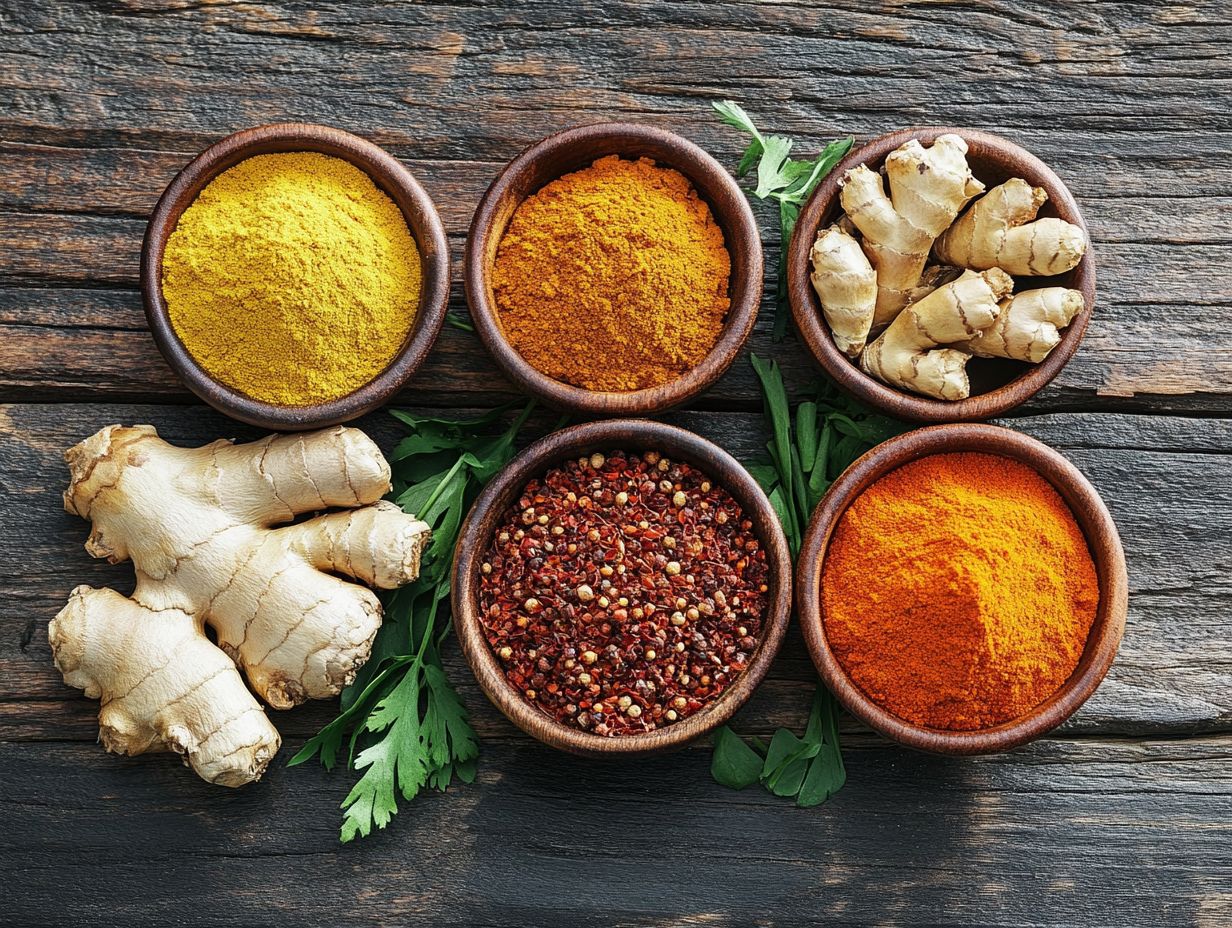
Ginger, a truly versatile spice and herbal remedy, not only elevates the flavor of your meals but also promotes healthy circulation and supports heart health thanks to its remarkable anti-inflammatory properties.
Packed with antioxidants, ginger plays a crucial role in reducing cholesterol levels and preventing blood clots, which significantly contributes to your overall cardiovascular well-being.
To enjoy these benefits, you can effortlessly weave ginger into your daily diet by adding fresh ginger to smoothies, teas, or stir-fries.
- Ground ginger is a fantastic addition to baked goods or can serve as a seasoning for savory dishes.
However, it’s essential to keep moderation in mind; excessive intake may lead to digestive discomfort. If you re taking blood-thinning medications, it would be wise to consult a doctor before ramping up your ginger consumption to avoid any potential interactions.
What Causes Poor Circulation?
Wondering why your circulation might be sluggish? Let s explore some common causes. Poor circulation can stem from a variety of underlying conditions, including heart disease, diabetes, and certain lifestyle choices. This highlights the need for awareness. Proactive changes can enhance your vascular health.
Obesity, marked by excessive body weight and fat, can significantly hinder blood flow. Similarly, smoking doesn t just narrow your blood vessels; it also diminishes oxygen supply, which further exacerbates circulation problems. Additionally, medical conditions like peripheral artery disease, a condition that narrows blood vessels in the legs, reducing blood flow, can cause discomfort and reduce blood flow to your limbs.
Recognizing symptoms like numbness, tingling, or persistent coldness in your extremities is vital. Don t wait take action!
By understanding these risks, you re given the power to make informed lifestyle choices. Adopting a balanced diet, staying active, and quitting smoking can foster better vascular health and enhance your overall well-being.
How Can Poor Circulation Affect the Body?
Poor circulation can have a profound effect on various bodily functions, manifesting in symptoms like cold hands, fatigue, and potentially severe health issues such as heart disease if left unchecked.
Inadequate blood flow can lead to discomfort and pain in your extremities, often resulting in numbness or tingling sensations.
Organs that depend on consistent circulation may struggle, particularly the kidneys and digestive system, which can become compromised over time.
Poor circulation can lead to long-term complications, including chronic wounds or infections, especially in the lower limbs. It s crucial to recognize these signs early to prevent more serious conditions, ensuring that prompt intervention can take place. This proactive approach not only safeguards your overall health but also enhances your quality of life.
What Are the Symptoms of Poor Circulation?
Symptoms of poor circulation might appear as cold hands and feet, numbness, or ongoing fatigue. These signs indicate potential health issues that need your attention.
Such symptoms often point to broader concerns about your heart health. Reduced blood flow can lead to serious conditions like heart disease or peripheral artery disease.
If you notice unusual paleness or skin discoloration, frequent cramping, or swelling in your extremities, take these signs seriously. Ignoring them could worsen existing problems or introduce new complications.
If you are dealing with persistent symptoms, consult a healthcare professional. This proactive step is essential for your long-term heart health.
How Can Herbal Remedies Improve Circulation?
Herbal remedies like garlic, turmeric, and ginkgo biloba can naturally improve circulation. These alternatives help enhance your vascular health without using pharmaceuticals.
These plants contain powerful active compounds allicin in garlic, curcumin in turmeric, and flavonoids in ginkgo biloba. Each of these plays a vital role in promoting better blood flow.
Allicin helps relax blood vessels and lower blood pressure. Curcumin is known for its anti-inflammatory properties, while flavonoids enhance endothelial function, crucial for healthy blood vessels.
To include these remedies in your routine, try these suggestions:
- Add crushed garlic to your meals for flavor.
- Mix turmeric into your smoothies for added health benefits.
- Take ginkgo biloba supplements as directed.
Always consult a healthcare professional before starting any herbal remedies. This ensures they work well with your existing health conditions and medications.
What Are the Possible Side Effects of Using Herbal Remedies?
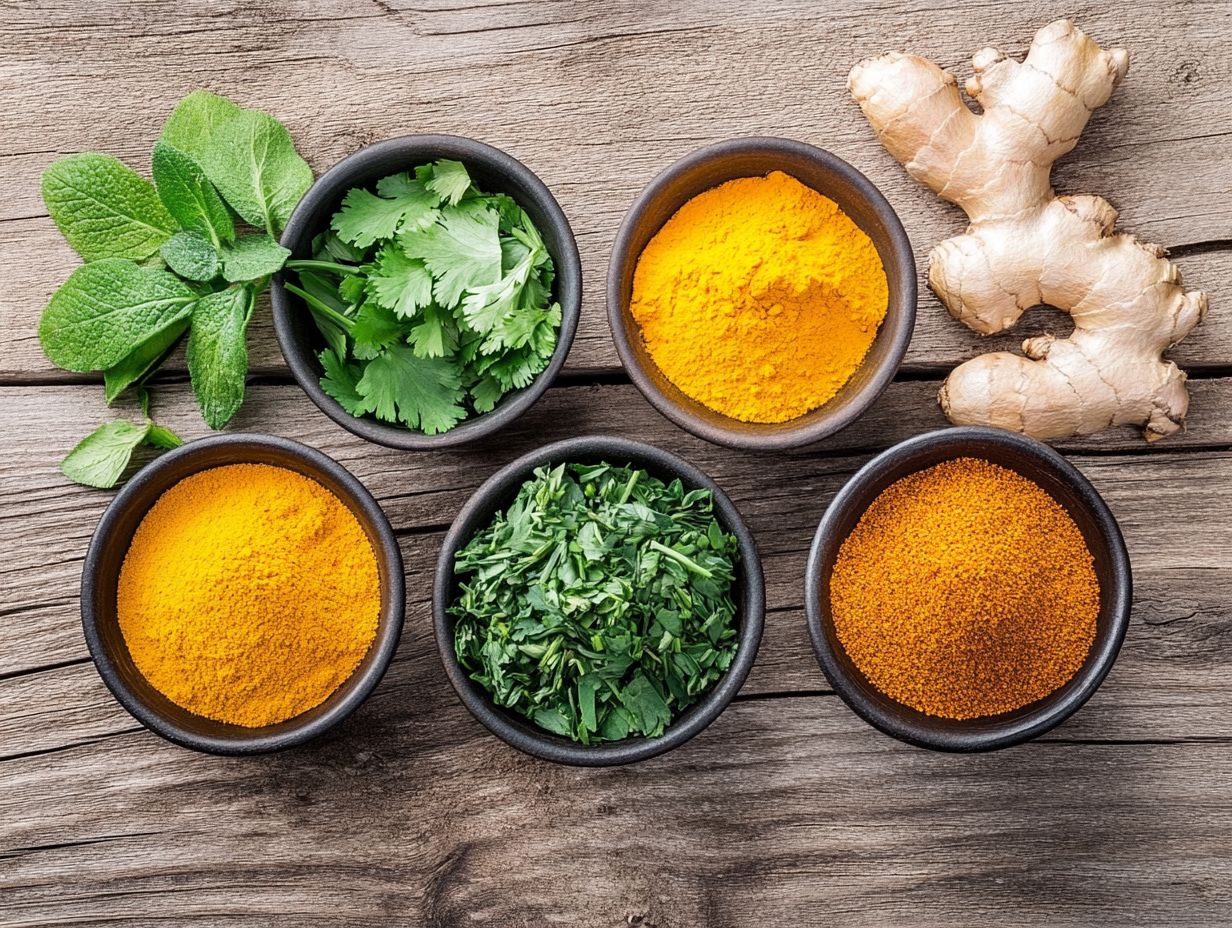
Herbal remedies like ginkgo biloba, garlic, and turmeric offer many health benefits. However, it’s crucial to be aware of the potential side effects, especially regarding medication interactions.
Side effects may range from mild digestive issues to serious allergic reactions or increased bleeding risks. If you consider using these natural supplements, consult your healthcare provider for safe usage.
This consultation helps evaluate your health history and current medications. Your provider can guide you on appropriate dosages and avoid harmful interactions.
Practicing caution is important. Start with lower doses and monitor your body’s reactions for added safety while exploring herbal options.
What Are Some Other Ways to Improve Circulation Naturally?
In addition to herbal remedies, adopting a few lifestyle changes can significantly improve your circulation. Simple activities can yield incredible results.
Engaging in aerobic exercises like walking, cycling, or swimming boosts heart health and enhances blood flow. A balanced diet rich in fruits, vegetables, whole grains, and healthy fats supports your vascular function.
Staying hydrated is equally important. Proper fluid intake helps maintain blood viscosity and circulation.
To incorporate these practices, set reminders for regular movement and prepare meal plans focusing on nutrient-dense foods. Always carry a water bottle to promote daily hydration.
When Should One Consult a Doctor for Poor Circulation?
If you re experiencing persistent symptoms of poor circulation, don t wait! Consult a doctor, especially if these issues disrupt your daily activities or hint at potential heart health problems.
Pay close attention to warning signs like:
- Numbness
- Tingling
- Cold extremities
- Swelling
These can indicate blood flow problems. If you often feel fatigued or experience leg cramps while walking, you might be facing more serious health risks.
Putting off seeking medical advice could lead to complications such as blood clots, strokes, or other cardiovascular diseases, so it s essential to prioritize these concerns.
By engaging with healthcare professionals early on, you can access timely interventions, lifestyle recommendations, and treatment options that could significantly enhance your overall well-being.
Can Herbal Remedies Be Used Alongside Medications for Circulation?
While herbal remedies like ginkgo biloba and garlic can enhance traditional medications for circulation, always consult your healthcare provider to avoid any adverse interactions.
Certain herbs can alter the effectiveness of your prescribed treatments or amplify their side effects, complicating your health. With the growing popularity of these natural remedies, it s easy to feel tempted to self-prescribe without fully grasping their impact.
Seeking professional guidance is essential not just for your safety, but also for optimizing the therapeutic benefits of both herbal and conventional treatments.
Your healthcare provider can assist you in crafting a balanced approach, ensuring that every aspect of your health is thoughtfully considered throughout your treatment journey.
How Can One Incorporate These Herbal Remedies into Their Daily Routine?
Incorporating herbal remedies like garlic, turmeric, and ginkgo biloba into your daily routine is simpler than you might think. A few dietary adjustments and the inclusion of supplements can significantly enhance your circulation and heart health.
For example, think about adding fresh garlic to your stir-fries or salad dressings. Not only does it boost flavor, but it also delivers renowned heart benefits.
Turmeric is another powerhouse that can easily find its way into your smoothies or golden milk lattes, where its vibrant color and warmth elevate both taste and nutrition.
As for ginkgo biloba, consider taking it in capsule form each morning to support your cognitive functions throughout the day.
To truly maximize the effectiveness of these herbs, consistency is key. Daily doses of turmeric and ginkgo biloba can be particularly beneficial, while you can enjoy garlic in multiple meals to keep its active compounds working for you.
What Are Some Precautions to Take When Using Herbal Remedies for Circulation?
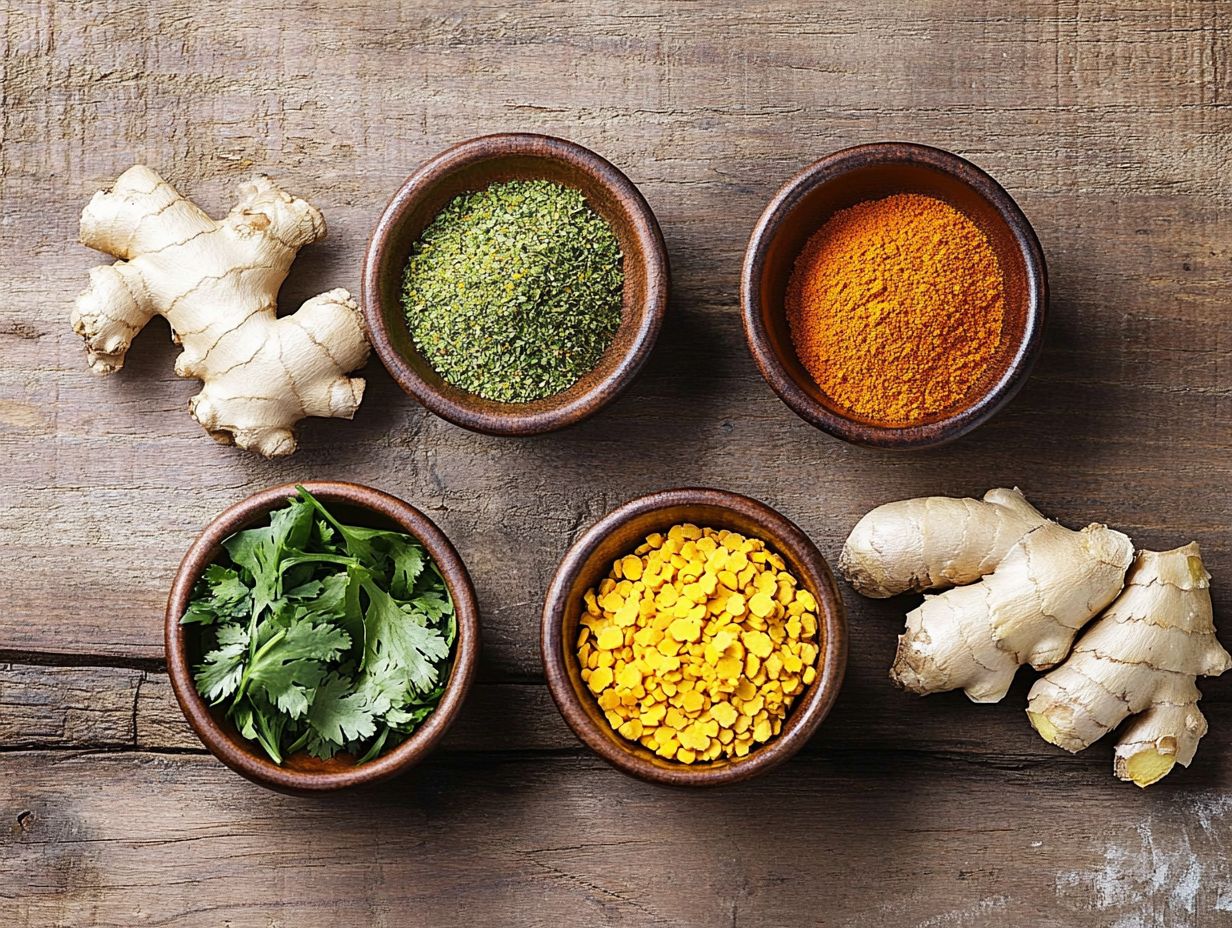
When exploring herbal remedies for circulation, it s vital to take the necessary precautions to reduce potential side effects and ensure your safety, especially if you have underlying health conditions.
Before diving into these natural therapies, assess any possible allergies you might have, as certain herbs could provoke adverse reactions in sensitive individuals. Be attentive to any existing medications you re taking; some herbs can interact negatively, impacting their effectiveness or even leading to unexpected health complications.
Thoroughly reviewing your personal health history is equally crucial, as those with pre-existing conditions might experience exacerbated symptoms or complications.
Consulting with a healthcare professional empowers you to make informed decisions, ensuring that your use of herbal remedies aligns seamlessly with your overall health and well-being.
Frequently Asked Questions
What are the top 5 herbal remedies for better circulation?
The top 5 herbal remedies for skin conditions include ginger, cayenne pepper, ginkgo biloba, garlic, and hawthorn.
How does ginger improve circulation?
Ginger contains compounds called gingerols and shogaols that have anti-inflammatory properties and can help improve blood flow by widening blood vessels.
Can cayenne pepper help with poor circulation?
Yes, cayenne pepper contains a compound called capsaicin, which helps stimulate blood flow and improve circulation.
Speak to your doctor today to learn more about improving your circulation!
What is the recommended dosage for ginkgo biloba to improve circulation?
The recommended dosage for ginkgo biloba is 120-240 mg per day. This should be taken in divided doses to enhance circulation.
Is it safe to consume garlic for better circulation?
Yes! Garlic is safe, and it effectively boosts blood flow.
Can herbal remedies for better circulation interact with medications?
Yes, consult with a healthcare professional before trying herbal remedies. They may interact with certain medications and might not be suitable for everyone.

